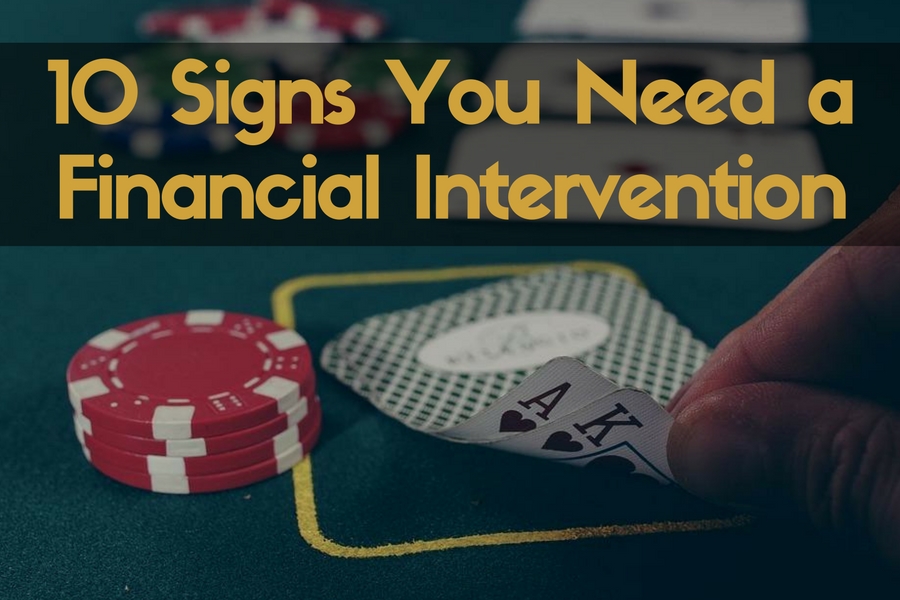For most people, the word “intervention” brings to mind a last-ditch attempt to save a loved one from the evils of drug or alcohol addiction. In reality, an intervention can also be very helpful for an individual who is suffering from poor financial management, expensive addictions, and mountains of debt.
As with any other form of intervention, the goal is to save someone from himself or herself. You have someone you care about and you see his or her financial life is spiralling out of control – you don’t have to wait until they are penniless to step in. Financial trouble is as good a reason as any to intervene and try to help someone you love get back on track.
But an intervention is not something you should take up on a whim. Make sure you see at least one of these ten signs before you start planning a financial intervention:
Unpaid Bills
This is the first sign to watch out for. Allowing bills to pile up and getting multiple warnings from utility providers is a sure sign that there’s financial trouble. An intervention can help your friend or family member figure out where the problem lies and what needs to be done.
Defaulting On Loans
A lot of people have heard myths on defaulting on loans, and they may assume that it’s perfectly fine. Not true. Student loans, for example, will never be forgiven. And you can’t even claim bankruptcy to get out of your student loan debt.
Defaulting on loans happens for two reasons: (a) the borrower lacks knowledge of the loan agreement’s details; and (b) the borrower simply doesn’t have enough money to pay the monthly payments. Either way, an intervention is in order before things get worse.

Uncontrolled Spending
Spending too much is okay once in a blue moon. Everyone needs to indulge once in a while.
The problem starts when you start indulging too often.
People who shop compulsively may need to see specialists who can help them with this addiction. Since it’s a compulsion, it’s probably rooted in something deeper and will require the assistance of a specialist.
Gambling Addiction
At first gambling may begin as a fun night out. But then a person begins to win a little and things get exciting.
But there are instances where people get so addicted to the thrill of winning that they spend every pay check on gambling whether they win or not. That’s when they need professional help.
In fact I remember a story in our local paper a few years ago about a young man that was literally taking his weekly pay check to the casino every weekend and gambling in the hopes of doubling his pay check. Instead he lost it, and then some.
Unfortunately he got to a point where he couldn’t pay his rent or any other expenses and instead of seeking help he jumped off the balcony of his apartment and died.
His is a very extreme story, but sadly it does happen.
Risky Investments
Similar to gambling, taking on risky investments isn’t a financial thing – it’s emotional.
People who feel a rush in putting down money on risky investments are gamblers, even if they’ve never been to a casino.
There are also investors who purchase risky investments not because they want the rush, but because they’re buying into fantasies, such as hitting the jackpot by buying penny stocks. Both are problematic attitudes towards finances.
No Savings Or Retirement Fund
Millions of people do not have money saved away for a rainy day.
Unsurprisingly, many are financially unprepared for retirement.
Although it may be a slightly less frightening sign compared to the others on this list, it might be linked to other problems like excessive spending. It’s a good idea to stage an “informal” intervention or try to talk to your loved one and discuss the value of savings.
Heavy Borrowing From Bookies And Private Lenders
Borrowing in itself should not be considered a problem. A lot of people have to take out loans for cars, homes, and even education.
However, if you notice that your loved one borrows constantly and regularly – one loan on top of another – simply to pay debts off or afford luxuries, then there’s a problem.
Growing Credit Card Debt
This is closely tied to excessive shopping. It’s particularly true for young people who may be experiencing the thrill of using credit cards for the first time. What to look out for: multiple credit cards, large amounts of debt, and paying only the monthly minimum.
Consistently Over-Budget And Unable To Make Ends Meet
Another sign that your loved one needs a financial intervention is when he or she consistently has to forego some necessities in favor of others.
For example, is he or she already choosing between shopping for food and paying the electric bill? Try to chart your loved one’s monthly budget to see if there is overspending.
Being consistently over-budget is a sure sign that there’s financial trouble.
Financially Dependent On Others
Do you have family members or friends that turn to you quite often asking for money, or asking you to buy them things? You may not realize this, but it’s another sign that it’s time for a financial intervention.
Though you may feel guilty, instead of giving them money, use this as a time to either help them with their budget, help them find a job, or help them find professional help and guidance.
In some cases you may be dealing with people that do not care about their finances at all, and when you try to help them you feel like you are getting nowhere. But there are also people that are in financial trouble simply because they do not know any better. And quite often, they are very receptive when others offer suggestions and assistance on how to manage things better.





